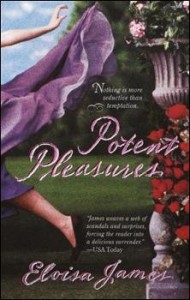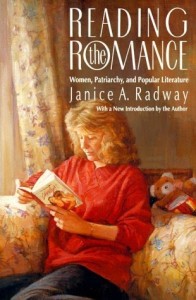
I’m very interested in the career of Eloisa James, because she’s an English professor in real life and moonlights as a romance author—although who knows, maybe by now she considers professor of Shakespeare her moonlighting gig, given her commercial success. I’ve read most of her romances (though not her memoir about Paris and not her academic work) and have Once Upon a Tower waiting on my bedside table. I first read Potent Pleasures several years ago, and recalled finding it refreshingly different from the usual romance novel—almost sui generis, though not quite. I recalled feeling enchanted and satisfied. It was also rather racy, I thought at the time, enough to leave even this jaded reader pink-cheeked. So when the title cropped up among the Kindle books available through my local library, I thought, why not remind myself what I liked so much the first time.
One MFA in creative writing and one Ph.D. in literature later, what a different read.
James is smart and funny, and always has been from this, her first novel. (This excellent interview with the Southeast Review gives a great sense of her background and approach.) The book is full of little period details that provide texture and often entertainment: the hero’s problems with the tight-fitting pants of the era, the dangers of ballroom chandeliers dripping wax, a crack about the Prince of Wales wearing gold heels. Literature nerds like me love references and in-jokes, for instance the scene when the characters are at the theater watching the infamously-revised King Lear, the one where Cordelia doesn’t die.
My students and I frequently joke that studying ‘real’ literature ‘ruins’ us for genre fiction, whether the class is creative writing or literary analysis. But we all know that’s not untrue; a trained eye is better able to pick out crudities, yes, but on the whole our enjoyment of a work, any good work, is enhanced by our stores of knowledge. And also I am not of the camp that decries the romance genre as anti-feminist. The debate lingers on, a useful strawman for the sake of argument, but I tend to agree with Janice Radway in Reading the Romance that, by and large, the readers of romance are not avidly devouring a heteronormative, female-subjectifying ideology that enslaves them. Radway observes that the overwhelmingly shared tenor of the romance genre, in its mainstream form, is that the heroine wins a hero who provides her not just with passion, companionship, respect, and protection, but also nurturance. (Interesting analysis of Radway’s book here.)

The real fairy-tale is finding a partner who is tender, observant, sensitive to her needs, and devoted to her pleasure. I can agree with the argument that, in creating a fictional world that is centered around gratifying the heroine’s needs, both emotional and physical, the traditional woman-centric plot of the modern romance is to some degree empowering.
Except for what I think of as the occasional anti-feminist trope. Which is why it surprised me to find some many of them in James’ Potent Pleasures, which I apparently missed the first time around.
I was first surprised, actually, by the writing itself, and how much of a first-draft feel it retained. (My first drafts, anyway.) Point of view reeled recklessly from head to head, sometimes several times on a page. Supporting characters got developed and then dropped away. Minor characters popped out of the scenery for a moment, acquired a history, motivations, interesting thoughts, and then disappeared. While this technique works for a sprawling 19th century work of prose, it meshes less well with the romance genre, which builds tension on its focus to the major leads. And while it could be entertaining, for instance in the small but vivid cameos by Mall the third housemaid, or Taffeta the tabloid reporter, or even Cecil the footman, at other times it could be confusing—three different characters named Peter, by my count, none of whom mattered to the actual story. Perhaps this is sheer envy speaking, since I’ve never had the good fortune to have a first or even an early draft sold and published, and sometimes not heavily revised work, either. There was a great deal of energy in the writing, however, and none of the head-popping sprung a nerve of actual dislike.
The hero did, though. And that is where my accusations of antifeminism come in. I intend to number them here.
My first and most enduring complaint has to do with the reformed-rake trope. Perhaps I am simply using a presumably feminist argument to complain about a theme I just don’t like. The hero, made arrogant and unfeeling by a social world which exists entirely to address his whims, treats women as if they exist only for his own gratification. Once he’s gratified, they’re forgotten; if they end things before he can, they become an obsession; if they cease to please him, they become an embittering canker which infects him and leads him to be a terror to all women. Alexander Foakes, Earl of Sheffield and Downes, is guilty of all of these. The trope has it that one splendidly unique woman will conquer the hero’s heart, humble him, and ensure his sexual constancy and devotion to the mutual lifelong fulfillment of them both. I understand the fantasy. But I find it distasteful. It’s explained by one of two ancient “rules” regulating male psychology, neither of which is particularly flattering to women: either the secret to the man’s heart is not giving him what he wants (for which reason the woman is instructed to play coy, not appear too accessible or eager, tell him she has plans if he requests a date any sooner than a week in advance) which makes her, as the prize he must strive for, all the more valuable; or, the power of the chaste, good woman is so immense it can transform selfish lust to gratifying love, and that is why a woman must guard her innocence and never give it out to any but her husband.
Alexander Foakes, in the novel, never really gets that moment of touching humility. What drives him, from the beginning, is lust. What later drives him to repent of his selfish, stupid, and cruel actions toward the heroine (and there are any number of them) is that he simply cannot resist her physical presence. He must be in her bed. And this is where I find the reformed-rake trope least appealing. In reducing the hero to an instinctive animal driven mindlessly by his own desires, to the point that he must, must! must! have the heroine—well, inspiring such helpless lust can only do a woman so much credit. The reformed-rake trope works when it turns on the hero’s emotional transformation: when the love of the good woman is so powerful that it heals the most scarred and hardened heart. That’s the heart of the fairy tale of Beauty and the Beast, why readers have been falling in love with Mr. Rochester from the first publication of Jane Eyre. But Alex Foakes can only conclude that he “loves” Charlotte because, while he’s in Italy, he can’t stop thinking about having sex with her. He’s never very smart, or intuitive, or perceptive, or nurturing, in the ways that Radway identified. He’s big and handsome, and Charlotte suffers from mind-fogging attraction to him, but beyond that, he’s not much of a prize.
This was the second point about the novel that struck my (perhaps all-too-sensitive) antifeminism nerve. Charlotte forgives Alex his stupidity, his cruelty, and his repeated lack of interest in her well-being or welfare when contra to his own wishes, desires, or beliefs. She doesn’t want to marry him; he is determined to overcome her resistance through imposing physical touch upon her, because of course he is so irresistible that she will melt like putty in his arms. And she does. She can’t resist him, because however much like an ass he behaves, he pleases her in bed; that much is made abundantly clear. So she continually forgives him, and keeps going back to him, even though he repeatedly abandons his daughter, and her, says cruel things to her, makes plans to hurt and punish her, and goes into an insane rage when it turns out that she is a person with thoughts and feelings and interests who does not exist only to fulfill his every whim. As I said before, none of this behavior made him seem very much like a prize to me. There’s a delicate line that authors walk with this type of hero; you’re supposed to love him even as you hate him. But Charlotte, too, goes weak-kneed when he’s around. And so she returns to him, forgives him his cruelty and stupidity, promises to trust him and give him yet another chance, and agrees to put the well-being of two vulnerable children into his hands, even though he has not in any single way proven himself capable to caring for the welfare of any person aside from himself—not his child, not his twin. He agrees to help Lucien in his escapade in France not out of feelings of charity or compassion but because there is some “gentlemanly” code to which he—in this instance only—must adhere.
So I didn’t like Alex, and the reason I didn’t like him, as I am claiming, is because he embodies three antifeminist tropes of the romance genre to which I generally object. And here’s the third: the masterful—and mastering—sexuality of the hero, hand-in-hand with the heroine who likes punishing sex. Actually all three are just part and parcel of the not-very-flattering-to-men hero-stereotype of a man who simply can’t control his urges when near the heroine, so immensely desirable is she. Of course, this is supposed to be empowering for the heroine—I’m so sexy, it blows his wee little mind. She is so alluring that he is reduced to mush and can think only of how he must devour her. Some examples:
“Alex’s kiss changed. His mouth settled over hers with intent, demanding, forcing her mouth wider open. His tongue took on a wicked rhythm, coercing, mastering her. Charlotte found herself clinging helplessly to his shirt front, her head thrown back, completely vulnerable to Alex’s onslaught” (242).
“. . . his tongue drove savagely into her, an erotic assault that vanquished an already subdued victim” (244).
“. . . even as Charlotte’s mind struggled, her body responded” (275).
Later there is much of his “ramming his way” (283) into her (on their wedding night, when he assumes she is a virgin). And so on.
I am actually not so much of a prude that I don’t understand S&M, or the erotic charge of physical power. I do not think that the romance genre needs to be sweet, tender scenes among fields of daisies all the time. Surely readers have a wide variety of tastes, and are looking for a wide array of vicarious satisfactions. But it seems to me that physical and sexual mastery, as a romance trope, is most palatable when it comes with an element of emotional submission, and most feminist when it insists on a balance of power: the heroine can enjoy being physically submissive because she knows the hero will never hurt her, and in fact her desire is to be dominated; the hero can enjoy his masterfulness because he senses this desire, and the purpose is their mutual pleasure. In this book—and there’s always the possibility that I am just a poor reader—it didn’t seem that Foakes was out for anything but total submission, total conquest—the gratification of his own desire to have a passionate partner (antifeminist) versus an understanding or celebration of this remarkable woman who has consented to let him touch her (feminist). The result is that the ending, and their reunion, was ultimately unsatisfying; I agreed too heartily with his own admission that he didn’t deserve Charlotte, and I rather wished he would just go away. In fact, at one point where his author gave him the grace to realize he was a complete idiot, he thought he just might as well go shoot himself, and I found that a more satisfying suggestion than the alternative.
So what’s the lesson here? Clearly I enjoy romance novels that are a little more feminist in their tropes. None of the above should take away from the enjoyment which many, many readers find in James’ books, and I myself have enjoyed any number of them. But I did find it interesting to see how many antifeminist moments cropped up in this book, and I’ll be interested in thinking about how James’ style has evolved as I read Tower.

